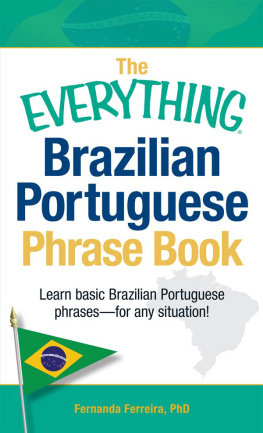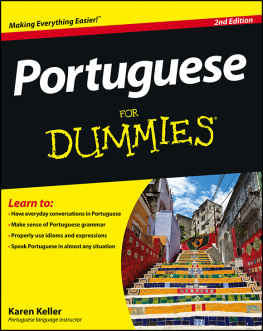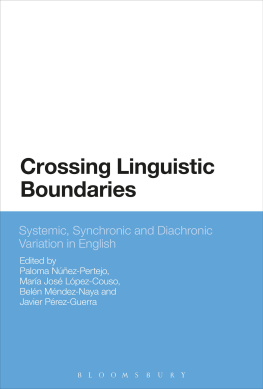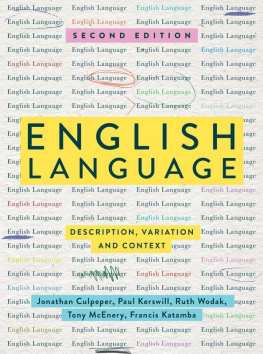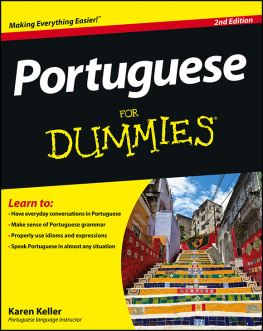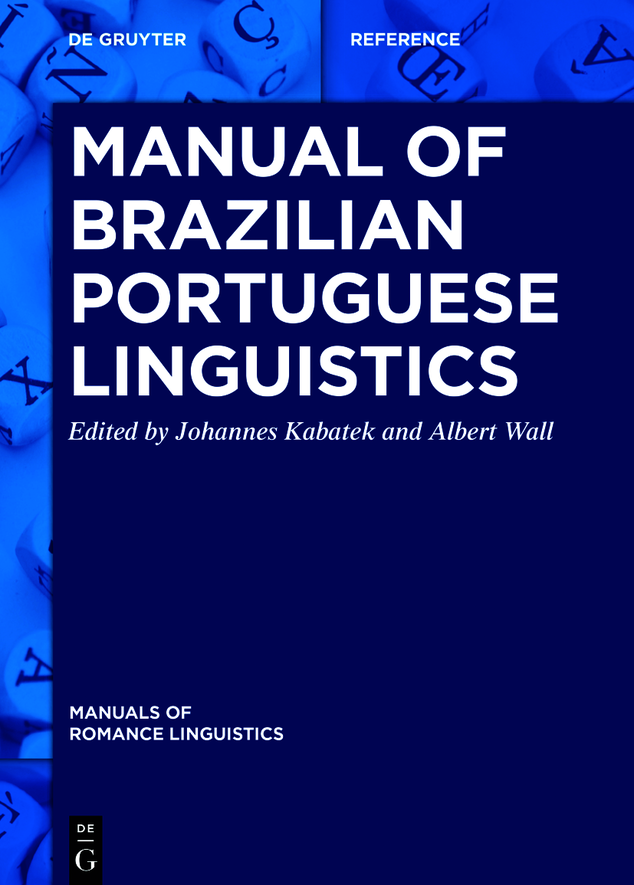The Deutsche Nationalbibliothek lists this publication in the Deutsche Nationalbibliografie; detailed bibliographic data are available on the Internet at http://dnb.dnb.de.
Brazilian Portuguese linguistics as a subject on its own
This is the first comprehensive manual on Brazilian Portuguese (BP) linguistics in English and the second manual on Portuguese (following the publication of the Manual de Lingustica Portuguesa in 2016) in the De Gruyter MRL series. This perhaps requires some explanation: why another manual about the same language? There are at least two reasons for this. The first is the language itself, and the fact that BP is not just a colonial continuation of Portuguese with a few particular characteristics, but ratherparadoxically both a different language and the same language. The differences are in part quite old, but many of them have changed their status recently and have thus become visible, to be seen not only in substandard varieties. The second reason, closely related to the first, is the current state of the art in BP linguistics. In recent times, linguists from across the world have shown a particular interest in BP, and in Brazil an enormous body of work on a wide range of linguistic areas has shed light on a reality which was quite unknown in the past. Much of what has been studied by linguists in Brazil has remained to a great extent hidden from a wider international public, and hence one of the aims of this book is to offer insights into recent research not only on BP linguistics in general but also work on BP produced in Brazil. Furthermore, over the last two decades, two large-scale projects have achieved remarkable milestones in publishing comprehensive and condensed results in two multi-volume series: in the first decade of the 21st century, a comprehensive Grammar of spoken Brazilian Portuguese was published, and in the following decade, the History of Brazilian Portuguese, see 1 Brazilian Portuguese linguistics: an overview for full references and project descriptions.
As for the language itself, the paradox noted above is a way of avoiding conflicts as well as misunderstandings. Emotional and ideological conflicts arise when linguists claim that typologically BP is so different from European Portuguese (EP) that the common name is somehow misleading: even if they are historically linked and still very closely related, EP and BP are at the same time two different linguistic realities. Why does such a simple and objective statement produce emotional reactions? Basically, because it leads to a misunderstanding between a judgement about linguistic difference and what is understood as an implicit political opinion about possible consequences, something like an aggression against the maintenance of unity. But the maintenance of unity on an abstract level, as well as the maintenance of a common orthographic system, are political issues of education and cultural organization and, one might argue, with objective differences or similarities or with historical links in favor of or against such maintenance. However, the decision will not emerge as an objective, causal consequence of these facts. Issues like the difference between EP and BP, as well as the political debate about Lusophone unity or diversity, will be addressed in this manual alongside descriptive presentations of linguistics facts, but both views will be separated as far as possible.
In debates in general linguistics as well as in Romance or in Portuguese linguistics, BP normally appears as a reality of its own. Instead of mentioning a few particularities of BP in contrast to EP, BP can be described as an autonomous diasystem that emerged historically from EP but which presents so many different features that an independent description seems to be more efficient, at least as a first step. Of course, comparison with EP makes sense on all levels of linguistic description, but it should always be a comparison of two realities on the same level, not between a default case and putative or claimed deviation.
BP is a Romance language that is part of the New Romania, a consequence of the Portuguese colonization of South America. Its base is 16th century Portuguese, modified by internal evolutions as well as by contacts with the native peoples and with enslaved people deported from Africa, plus contact with other European languages present in Brazil, especially since the 19th century. The contacts might have had limited consequences, and these mainly in the lexicon, and indeed, descriptions of the particularities of BP until the 19th century and of historical documents might lead us to think so, yet a closer look shows that something new has emerged beneath the surface of what appears in writing. By contrast to the Spanish crown, which created relatively independent infrastructures with universities, book printing and important colonial urban centers in the Americas, Portugal allowed neither printing nor the creation of a university in Brazil: the colony was strictly linked to Lisbon as the political and economic center, and to the intellectual primacy of the university of Coimbra, the only place where Brazilian people could pursue university studies. As early as the 19th century, some of the fundamental innovations of BP seem to have been achieved in the spoken, substandard language, in the first place the loss of many properties of Romance pro-drop languages such as an ongoing obligatorization of overt subjects and the rise of voc and a gente as subject pronouns. As in Middle French, this favors the loss of endings and entails several further evolutions that continue to the present day. In the 20th century, BP exists with a completely different prosody from its European counterpart, a fact that is due not only to changes in the rhythmic structure of BP, but also in EP with its ongoing reduction of unstressed vowels, especially in the variety of Lisbon.
In Brazil, several external developments have enhanced processes of prestige changes of vernacular features during the second half of the 20th century. While Rio de Janeiro, the traditional capital, used to function as a bridge to Europe, even after Brazilian independence, the artificial creation of the new capital Brasilia in the 1950s did not create a new center of gravity but rather produced a regionalization of Rios norma carioca, giving new weight to So Paulo, the largest urban center of the country, where mass media and economic power concentrate.
BP in the 21st century is still in a process of implicit and explicit debates about how to reorder its diasystem. Tensions between the colonial past, reflected in formal and written language, and the oral vernacular are nowadays above all tensions between socioeconomic classes within the country, and the answer to the question of what BP really is will always depend on the specific referent within the architecture of its varieties. Even among linguists, a normative view is not always strictly distinguished from descriptive approaches. However, we currently have at our disposal a large number of studies that allow us to recognize the multiple phenomena that characterize BP. Even if BP is spoken across half a continent, traditional linguistics stated that the vertical, diastratic variation was more clearly marked than the horizontal, diatopic one, as can frequently be observed in colonial situations. But this is also an impression due to the tradition of looking mainly at urban varieties in dialectological studies. More recent approaches also show significant regional variation. At the same time, urban BP is far from unitary, and Brazilian cities are complex social and linguistic conglomerates. Contactshistorical and actualare further factors in the diversity of the present configuration of BP. This handbook aims to provide comprehensive information about this very broad panorama.


